by Công Thành
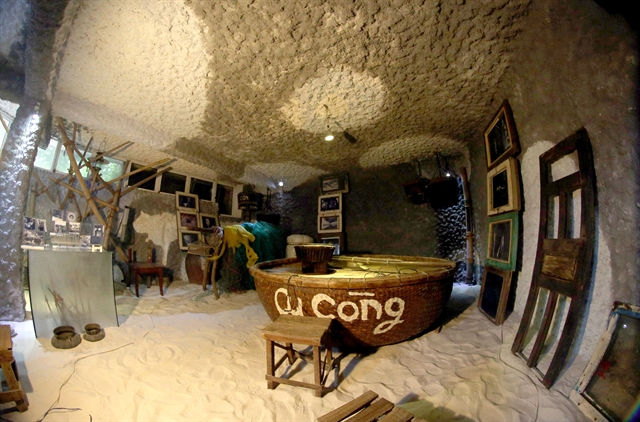
A coracle is displayed on a basement of a house in Đà Nẵng. — VNS Photo Trần Lê Lâm
Memories of unique fishing village culture are preserved in the Đồng Đình private museum in Đà Nẵng.
The fishing village corner, built from ruined trawlers, bamboo boats and coracles, stores hundreds of fishing tools that local fishermen in the ancient villages used to catch fish at sea long ago.
Bamboo baskets, ceramic jars, oil lamps, fishing nets, paddles and the main structure of a fishing vessel decorates the corner as a typical house of a fisherman family living along the coastline of Đà Nẵng and central Việt Nam in general.
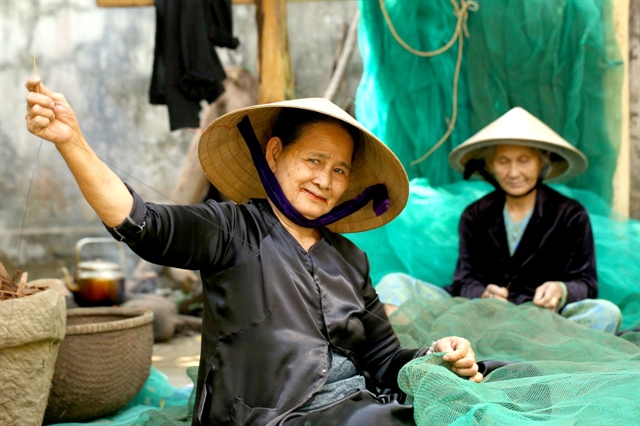
Old women in Mân Thái Village of Đà Nẵng weave fishing nets at the communal house. The village has been planned as an eco-tour site and fishing preservation area. — Photo courtesy of Quang Nguyễn
Since 2012, Lê Văn Út has worked at the museum. Previously he had been a fisherman for 20 years.
Út, 77, said although he had to earn his living from his teenage, he only did coastal fishing off the Sơn Trà peninsula.
“A small boat helped my family through the past years, but I had to leave to sell fish at the market due to poor health. Almost all fishermen in Nam Thọ Village retire at around my age,” Út said.
The old man collected fish from fishermen on Sơn Trà beach to sell at Hòa Phú market for years; but working at the museum has helped him revive his memories of fishing.
“The museum was designed by film director Đoàn Huy Giao, and serves as a living space of fishermen and community culture,” Út said.
“Booming tourism and the fast construction of coastal resorts on Sơn Trà beach pushed fishing villages behind the big skyscrapers. It doesn’t bring in much money, so fishing only remains as an odd job for a few families in the villages of Nam Thọ, Mân Thái and Thọ Quang.”
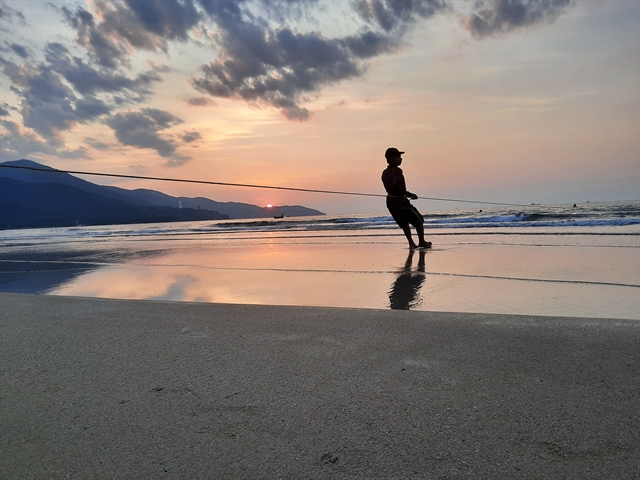
A fisherman pulls a fishing net on the beach of Mân Thái in Sơn Trà peninsula in Đà Nẵng. Local fishermen still earn a living from coastal fishing. — Photo courtesy of Huỳnh Văn Mười
Út said his youngest son was the only family member still earning a living from fishing.
A few elders occasionally weave fishing nets and bamboo coracles to order, so that they can earn a little extra cash.
Museum of memories
Giao's museum kept the fishing culture alive as a memory among the local people and for tourists in fast urbanising Đà Nẵng City.
“High-rise hotels and resorts have been kicking fishing villages off the beach for huge profits in booming tourism and property speculation. Only a few households still do fishing on small boats, and the centuries-old fishing villages and lifestyle are fading away,” Giao said.
“The museum will be a site for future generations to see how ancient fishing villages existed along the coast of Đà Nẵng.”
Giao, 76, said he spent years collecting the shipwrecks and ruined fishing nets and coracles to build the museum.
“Every exhibit at the museum shows how hard our ancestors worked to earn a living from the sea and how fishermen stored fish. Ceramic jars were used to ferment fish, and salt was prevalent among fishing families, while bamboo baskets were used to carry fish from boats to market,” he said.
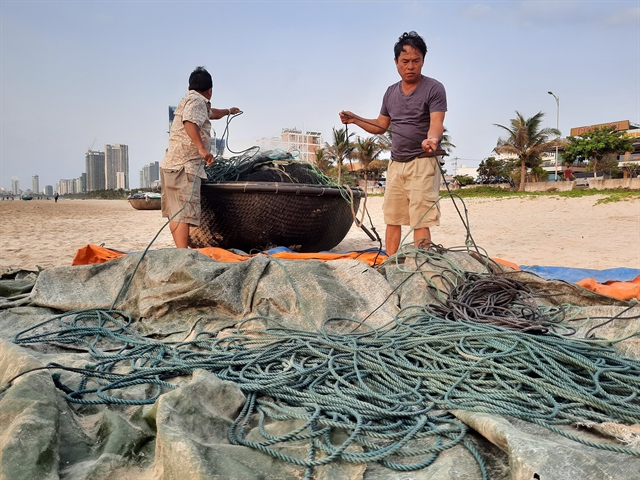
Fishermen collect fishing nets on the beach after a sea trip. Local fishermen used coracles for coastal fishing trips in Đà Nẵng. — Photo courtesy of Huỳnh Văn Mười
Photographer Nguyễn Văn Mỹ, also from Nam Thọ Village, spent many years recording images of the local fishermen and traditional culture of the local villages.
Mỹ has set up a basement room of his house to preserve an old coracle, a collection of fishing nets and even put white sand on the floor to serve as his own little museum of sea.
“It’s my childhood memories site. I preserve the fishing tools that my ancestors used to make for generations. The basement floor is filled with white sand from the beach, along with nets, paddles and a kerosene lamp. It is a quiet place for visitors to learn more about fishing villages,” Mỹ said.
“Actually, the villages are fading away due to tourism and urban development, but photo collections of the old fishing communities in Đà Nẵng will be stored at this little sea corner as a memory.”
Huỳnh Văn Mười, a resident in Mân Thái ward, a fishing village since 1735, has collected thousands of photos on fishing activities and festivals of the community for 30 years.
Mười, an amateur photographer, said he tried to record images of the last fishermen and their families before the fishing villages completely disappear from the beach.
Photo collections
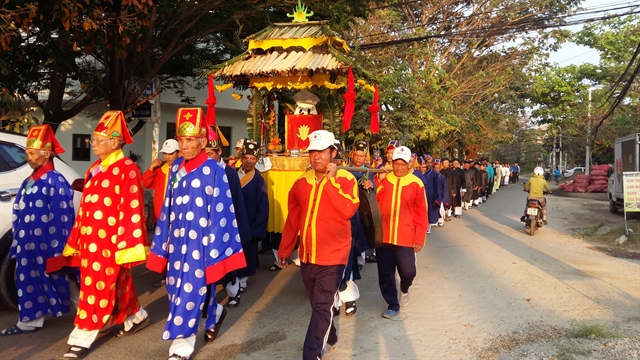
A Sea God worship ceremony at Mân Thái fishing village in Đà Nẵng. The annual event is a major traditional festival praying for peace and prosperity among fishing communities. — VNS Photo Công Thành
Only five per cent of the population in Mân Thái still do fishing, and the number of inshore fishing boats will fall in the coming years, according to Mười.
“I have been collecting photos and videos on the lifestyle of the fishing communities. Some of the best will go to public exhibitions promoting the culture of the fishing communities in the Sơn Trà peninsula,” Mười said.
“Memories of the village linger among the old people, and they are the last witnesses of the old villages. It’s the reason I took the photo collections before it had all died out.”
Trần Thị Nương, 80, said that she used to carry baskets of traditional fermented fish paste to sell in every village, but it became difficult as people moved to industrially-made fish sauce.
“Men went fishing, and women processed fish at home. Fermented fish and dried fish were bartered for rice, fuel oil and material for fishing. My sons kept the fishing trade going, but my grandson gets a better income from doing jobs at industrial parks or in tourism,” she said.
“We may be the last generation of the fishing village, and only the annual fishing festival helps the last relics of the lifestyle to survive.”
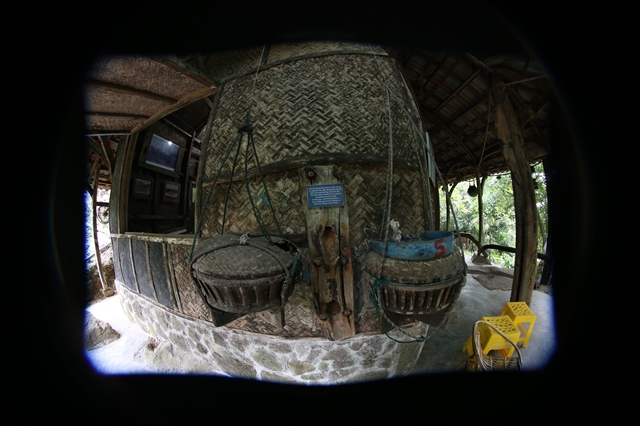
Bamboo baskets are displayed at the Đồng Đình Museum on Sơn Trà mountain of Đà Nẵng. VNS Photo Trần Lê Lâm
Đà Nẵng City’s culture authority plans to preserve ancient fishing villages and crafts during 2025-30, including hosting traditional cultural performances, whale temples and crafts for tourism.
A beach zone and living quarters from Mân Thái to Phước Mỹ, Thọ Quang – where the ancient fishing villages were located – have been planned as a community-based eco-tour zone with homestay services.
Mười said retired fishermen would join community-based tourism services by repairing fishing crafts and taking part in festivals to preserve the culture.
Though the fishing villages themselves are all but wiped out, the memories are set to linger long in the memory and be passed down to many future generations. — VNS
OVietnam